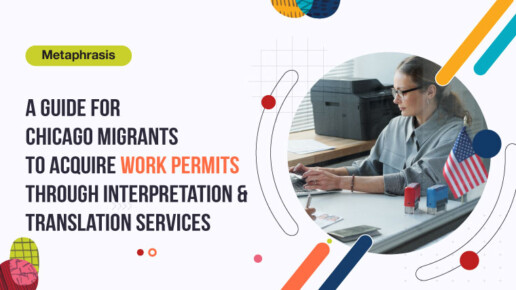A Handbook for Chicago Immigrants Obtaining Employment Permits via Interpretation and Translation Services
Obtaining a work visa for visitors to Chicago who wish to work can be a little challenging. You have to go by certain guidelines and specifications, and occasionally the wording can be unclear. Imagine attempting to discuss your career goals with someone, but the words become jumbled due to language barriers. That represents a challenge. Chicago immigrants must thus overcome these obstacles in order to comprehend the regulations, abide by them, and communicate clearly in order to obtain work permits. Metaphrasis is untangling a knot to unlock doors to career chances in this energetic metropolis is like that.
Language Barriers Faced by Migrants
Language is a crucial factor when applying for work permits, and immigrants in Chicago frequently face substantial language obstacles at every stage of the procedure. These obstacles may present difficulties at different points, therefore it’s critical to deal with them and find solutions.
Understanding Complex Instructions: Migrants may face difficulty understanding the intricate instructions and requirements associated with work permit applications. The legal language and terminology can be daunting, especially for those whose primary language is not English.
Expressing Intentions Clearly: When conveying one’s intentions and justifications for requesting a work permit, effective communication is essential. Language limitations could make it more difficult for immigrants to clearly express their objectives and ambitions, which could affect how well their applications are received.
Handling Legal Documentation: Applications for work permits require a lot of legal paperwork, many of which contain important information. Language issues may make it difficult for immigrants to understand and correctly fill out these forms, which could result in mistakes.
Ensuring Accuracy in Information Exchange: Language barriers might lead to misunderstandings that cause wrong information to be shared. This is especially important when supplying personal information, work background, and other pertinent application-related data.
Overcoming Interview Challenges: Language issues may provide difficulties when interviews are a requirement of the application process. During interviews, migrant candidates may find it difficult to convey their qualifications and talents, which could affect their impression overall.
Legal Information Access: It is essential to comprehend the legal rights and obligations related to work permits. Migrants may not have access to complete legal information due to language issues, which could result in them making decisions or acting without sufficient knowledge.
Ensuring that the application procedure for work permits for migrants in Chicago is equitable and easily accessible requires addressing these language challenges. In order to get over these obstacles, make communication clear, and eventually raise the likelihood that an application will be accepted, the importance of interpretation and translation services cannot be overstated.
How Interpretation Services Bridge Language Gaps
Effective communication is essential when it comes to work permit applications, and interpretation services are essential in helping migrants in Chicago overcome language hurdles. These services are a great resource for promoting precise and unambiguous communication during the application procedure.
Ensuring Clarity in Conversations: Interpretation services make sure that discussions between officials and migrants are understandable and straightforward. Professional interpreters assist in accurately communicating messages, lowering the possibility of misconceptions resulting from linguistic disparities.
Helping with Documentation: Interpretation services help migrants comprehend the substance of legal documents when navigating the paperwork associated with work permit applications. In order to guarantee that the documentation is completed correctly and in accordance with the criteria, this support is essential.
Supporting Interviews and Interactions: Interpreters help to ensure that people communicate effectively during interviews or encounters with authorities. We guarantee that the qualifications of migrants are appropriately portrayed by assisting them in coherently articulating their talents, experiences, and intentions.
Interpreting Legal Jargon: Legal terminology, particularly for non-native English speakers, can be intricate and difficult to understand. Interpretation services are experts in translating legalese, allowing immigrants to understand it and maneuver through the complexities of the application procedure.
Promoting Inclusivity: The provision of interpreting services helps to foster an environment that is welcoming to all applicants. These services guarantee that migrants, irrespective of their language background, have an equal opportunity to express themselves and take part in the application process by removing language obstacles.
Minimizing Errors and Miscommunications: The likelihood of errors and miscommunications is reduced when interpretation services are available. This minimizes the possibility of misconceptions that can affect the application when communicating important details, and private information, and answering questions from immigration authorities.
Interpreting services are essentially a vital resource for immigrants in Chicago who are applying for work permits. These services improve the overall efficacy of the application process by promoting clear communication and bridging language gaps. This, in turn, leads to a more equal and accessible pathway for persons seeking employment opportunities in the city.
Case Studies: Success Stories in Work Permit Acquisition
Maria’s Overcoming of Language Barriers: When attempting to obtain a work visa in Chicago, Maria, a resolute immigrant, encountered considerable linguistic obstacles. She was able to express her abilities and intentions clearly with the help of interpreting services. Maria’s success story demonstrates how overcoming language barriers throughout the application process can have a transforming effect.
Conclusion
Strong language support plays a critical role in the complex process of obtaining work permits in Chicago. Being a basic form of communication, language is essential to migrants’ ability to successfully navigate the challenges of the application process. Beyond only helping people with language barriers, the provision of complete language support—which includes services like interpretation and translation—becomes essential for promoting comprehension, equity in access to opportunities, and clarity. When we consider how important language support is, we see that it is more than just a service; rather, it is an essential facilitator that promotes inclusivity and gives migrants the confidence and accuracy to express their goals.

